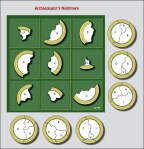About a month ago, I wrote this and this, detailing my experiences with grades and the events that brought me to teach at Saint Ann’s School, where grades are not allowed.
Well these damned grades are still around, and they continue to drive me crazy. Here’s a few more stories about how silly, misguided, misleading, harmful, and uninformative grades often are.
* * *
How many points is a photocopy worth? I mean, if you assign a homework problem, and someone photocopies the proof from the book, how many points is that worth? I only ask, because this just happened.
A couple friends are working on their Masters at NYU, and this term they are in the same Complex Analysis class. They’d like to discuss homework together, but Justin tends to put things off to the last minute, while Liz is a more meticulous student. When Liz wants to chat, Justin usually hasnt started, which drives her a bit crazy, especially when he gets better homework scores. This week it came to a bit of a head.
Put off and put off again, Justin’s homework was overdue. The last problem said something like, “feel free to use your text and the following property.” Looking through the text, he found a solution to the exact problem, property and all. “I could copy this down by hand, verbatim, or I could just photocopy the proof,” Justin thought, before heading to the copy machine.
So how much is a photocopy worth? FULL CREDIT!
Justin got full credit for photocopying a proof from the book and citing the reference. Despite Liz having worked this problem out and thought her way through, she earned a 4.9/5 on the homework to Justin’s 5.
Liz in a half-dejected tone – “I’m just not as smart as you.”
* * *
I’m wrapping up my own Masters program, though the luster and appeal of academic training are certainly fading. For whatever reason, I have little motivation for the two classes I’m taking this Fall. Note taking has been minimal, homework pushed off, and I spend most classes on my phone, texting, tweeting, and playing Whale Trail.
In keeping with mathematical tradition, most exams ask for replicated proofs from lecture. I’m usually very good at this kind of thing, because I listen to the lecture and make sense of it in real time. When the exam comes, I simply retell myself the story of the lecture and write it down, but having paid little attention this term I sensed impending doom.
As I walked in to my Field Theory exam, I was confident it would go terribly, and looking over the questions, I was certain. Unlike the good students who had memorized the notes, I knew none of them.
I just wrote down whatever I thought could resemble proof and put down any shred of detail I could recall. For one I simply included all of the premises and said things like “this contradicts the maximality of n, hence we see that f is irreducible over F,” without much attention to the absurd lack of mathematical rigor or value. About an hour later, I was the first to leave.
The professor must not have read the thing, because I got an 80, while friends I know to have strong command earned 60’s. Worse yet, I have an A at midterm, despite knowing for certain that I only sort of know the field theory.
* * *
How much do I need to say about how ridiculous these two stories are? Obviously Justin’s points were not earned for clear knowledge or mastery, not even for hard work. The very same is true of my exam score.
The first thing people ask about schools without grading is “if you don’t give grades how can colleges tell how good the kids are?” (The answer is obvious, you just tell them by writing about each child.) My question is this – If schools are going to continue giving grades as meaningless as these, then how can we tell anything?
We can easily blame these professors and say they’re “grading poorly.” Perhaps Justin deserved a zero. Perhaps I should have failed. If there’s any case to be made for grading, I’m certain these teachers have got it wrong, but these two stories point to a fact that is true across the spectrum of graded environments.
The central lesson: It’s about doing the work and not about the learning.
When we ask students to memorize and replicate for tests, this is surely the message. Even worse, we equate the work with learning, when they are plainly distinct.





